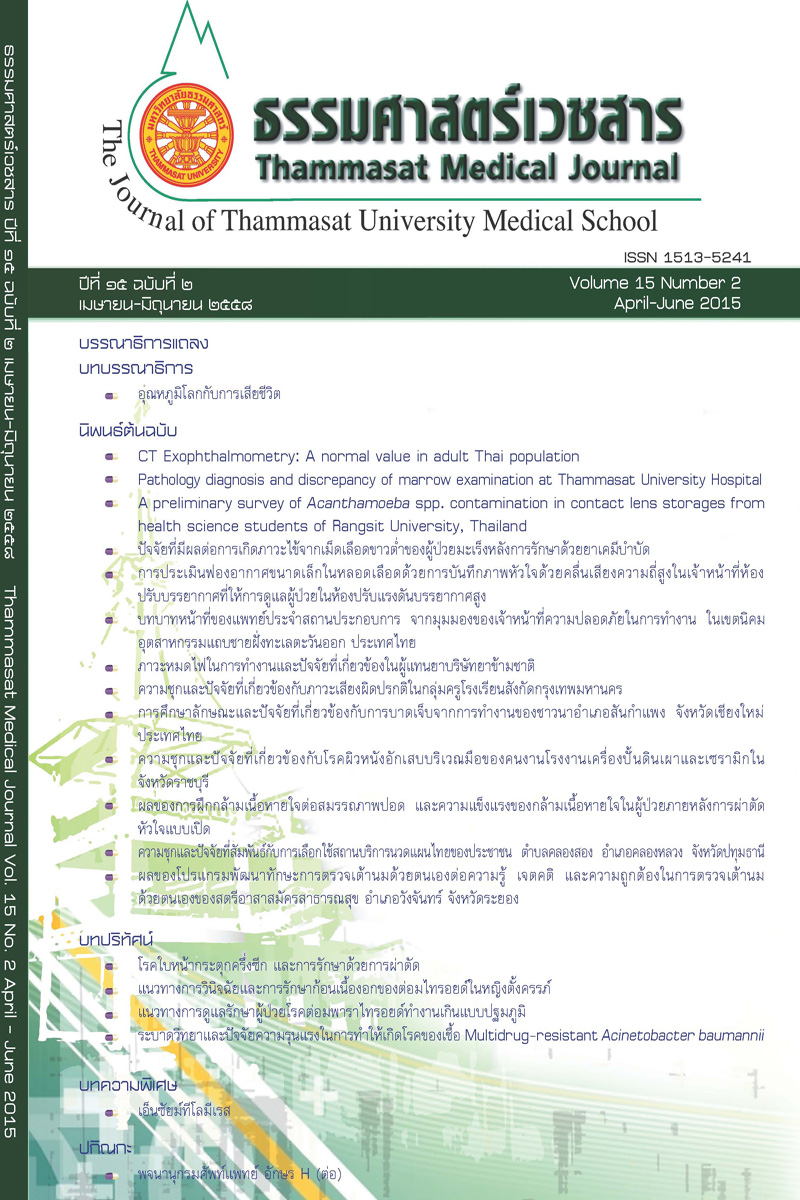Management of thyroid nodules and thyroid cancer in pregnant women
Keywords:
Thyroid nodules, Differentiated thyroid cancer, Pregnant women, Thyroidectomy, ก้อนเนื้องอกต่อมไทรอยด์, มะเร็งต่อมไทรอยด์, หญิงตั้งครรภ์, การผ่าตัดรักษามะเร็งต่อมไทรอยด์Abstract
Thyroid nodules and thyroid cancer discovered during pregnancy present unique challenges to clinicians. A balance is required between making a definitive diagnosis and treatment, while avoiding adverse impacts on the mother and the fetal health. There are such differences in management for diagnosis and treatment of thyroid nodules and thyroid cancer in pregnant women, compared to non-pregnant women. If clinical and ultrasonographic findings of thyroid nodules are likely benign or detected during last trimester of pregnancy, fine needle aspiration (FNA) may be deferred until after delivery. The use of radionuclide scanning is contraindicated during pregnancy. Because prognosis of women with differentiated thyroid cancer (DTC) identified but not treated during pregnancy is similar to that of non-pregnant patients, so thyroidectomy may be deferred until postpartum. Surgery is recommended during pregnancy in cases of large, rapid growth tumor or presence of lymph node metastases. During pregnancy the tumor needed to be monitored with clinical ultrasound. If there is indication for thyroidectomy, the operation should be done in 2nd trimester. For women previously treated thyroid cancer and have been exposed to radioactive iodine therapy (RAI) treatment, pregnancy should be deferred for 6 - 12 months following RAI treatment to ensure that thyroxine dosing has been stabilized before conception. The preconception TSH goal in women with DTC should be maintained during pregnancy.
Key words: Thyroid nodules, Differentiated thyroid cancer, Pregnant women, Thyroidectomy
แนวทางการวินิจฉัยและการรักษาก้อนเนื้องอกของต่อมไทรอยด์ในหญิงตั้งครรภ์
วิไลรัตน์ ประเสริฐ
ภาควิชาศัลยศาสตร์ คณะแพทยศาสตร์ มหาวิทยาลัยธรรมศาสตร์
บทคัดย่อ
แนวทางการตรวจวินิจฉัยก้อนเนื้องอก (nodules) ของต่อมไทรอยด์ในหญิงตั้งครรภ์นั้นคล้ายกับผู้ป่วยทั่วไปคือ ซักประวัติ ตรวจร่างกาย ส่งตรวจ Thyroid stimulating hormone (TSH), ultrasound และพิจารณาทำ fine needle aspiration (FNA) ซึ่งทำได้อย่างปลอดภัยในหญิงตั้งครรภ์ แต่ถ้า nodule นั้นมีลักษณะ benign จาก ultrasound หรือตรวจพบในช่วงไตรมาสสุดท้ายสามารถเลื่อนไปทำ FNA หลังคลอดได้ ส่วน radionuclide scan นั้นห้ามตรวจในหญิงตั้งครรภ์ เมื่อทราบผลว่าเป็นมะเร็ง ถ้าก้อนไม่โตเร็วและยังไม่กระจายไปต่อมน้ำเหลืองสามารถรอผ่าตัดรักษาหลังคลอดได้โดยไม่ทำให้พยากรณ์โรคแย่ลง ต้องมีการตรวจติดตามผู้ป่วยอย่างใกล้ชิดด้วย ultrasound เมื่อมีข้อบ่งชี้ เช่น ก้อนมะเร็งโตเร็วหรือกระจายไปต่อมน้ำเหลืองแล้วแนะนำให้ผ่าตัดในช่วงไตรมาสที่สอง กรณีผู้ป่วยมะเร็งไทรอยด์ที่เคยได้รับการรักษามาก่อนตั้งครรภ์และต้องกินยา thyroxine เพื่อลดระดับ TSH (TSH suppressive therapy) เมื่อตั้งครรภ์ให้กินยา thyroxine ต่อโดยให้ระดับ TSH อยู่ในเกณฑ์เดียวกับก่อนตั้งครรภ์ซึ่งพิจารณาตามความเสี่ยงของการกลับเป็นซ้ำ กรณีผู้ป่วยหญิงที่เคยได้ radioactive iodine therapy มาก่อนแนะนำให้หลีกเลี่ยงการตั้งครรภ์ ๖ - ๑๒ เดือนหลังรักษาเพื่อให้ปรับขนาดยา thyroxine จนผลการทำงานของต่อมไทรอยด์อยู่ในช่วงที่เหมาะสมก่อนตั้งครรภ์ เห็นได้ว่าการดูแลรักษาหญิงตั้งครรภ์ที่มี thyroid nodules หรือป่วยเป็นมะเร็งไทรอยด์นั้นมีรายละเอียดบางประการที่แตกต่างจากผู้ป่วยไทรอยด์ทั่วไป โดยคำนึงถึงการรักษาโรค ความปลอดภัยของมารดาและทารก
คำสำคัญ: ก้อนเนื้องอกต่อมไทรอยด์, มะเร็งต่อมไทรอยด์, หญิงตั้งครรภ์, การผ่าตัดรักษามะเร็งต่อมไทรอยด์



